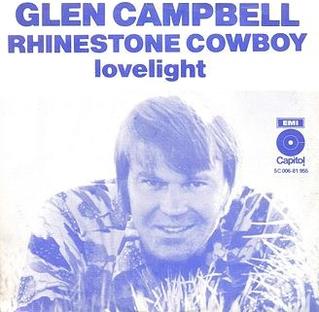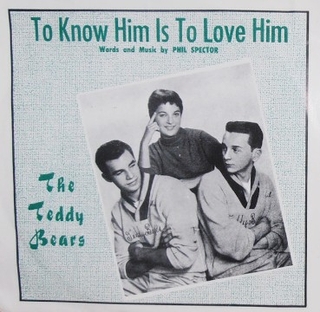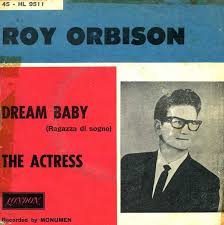
"Gentle on My Mind" is a song that was written and originally recorded by John Hartford, and released on his second studio album, Earthwords & Music (1967). Hartford wrote the song after watching Doctor Zhivago in 1966, as he was inspired by the film and his own personal experiences. The lyrics describe the reminiscences of lost love of a man as he travels through the country. An obituary for Hartford indicated that the lyrics are "about a hobo reminiscing about a lost love". The following year, Hartford released the song as a single on RCA Records.

"Mr. Sandman" is a popular song written by Pat Ballard and published in 1954. It was first recorded in May of that year by Vaughn Monroe & his orchestra and later that year by The Chordettes and the Four Aces. The song's lyrics convey a request to "Mr. Sandman" to "bring me a dream" – the traditional association of the folkloric figure. The pronoun used to refer to the desired dream is often changed depending on the sex of the singer or group performing the song, as the original sheet music publication, which includes male and female versions of the lyrics, intended.

"Angel of the Morning" is a popular song written by Chip Taylor, originally recorded by Evie Sands but which first charted with a version by Merrilee Rush. The song has been covered by many artists including Chrissie Hynde, Dusty Springfield, P. P. Arnold, Connie Eaton, Mary Mason, Guys 'n' Dolls, Melba Montgomery, Olivia Newton-John and Juice Newton, who reached the Billboard Hot 100 top ten with her version in 1981.

"Rhinestone Cowboy" is a song written and recorded by Larry Weiss in 1974, then popularized the next year by American country music singer Glen Campbell. When released on May 26, 1975, as the lead single and title track from his album Rhinestone Cowboy, it enjoyed huge popularity with both country and pop audiences.

"It's Only Make Believe" is a song written by drummer Jack Nance and Mississippi-born singer Conway Twitty, while they were touring across Ontario, Canada in 1958. Twitty was a relatively unknown rock n' roll singer at the time, and this song was his first hit, reaching No. 1 on the Billboard chart in November 1958 for two weeks.

"Let It Be Me" is a 1960 single by The Everly Brothers. The song is an English-language cover of "Je t'appartiens", which had been released as a single in France by Gilbert Bécaud in 1955. The song was a top ten hit for The Everly Brothers on the US Billboard Hot 100 and spawned many additional cover versions.

"Summer Wind" is a 1965 song, originally released in Germany as "Der Sommerwind" and written by Heinz Meier and German language lyrics by Hans Bradtke. Johnny Mercer re-wrote the song into English along the same themes as the original, which talked of the changing of the seasons using the Southern European sirocco wind as a metaphor. In America, it was first recorded by Wayne Newton and subsequently by Bobby Vinton and Perry Como.

Bobbie Gentry and Glen Campbell is a studio album by American singer-songwriters Bobbie Gentry and Glen Campbell. It was released on September 16, 1968, by Capitol Records.
"By the Time I Get to Phoenix" is a song written by Jimmy Webb. Originally recorded by Johnny Rivers in 1965, it was reinterpreted by American country music singer Glen Campbell on his album of the same name. Released on Capitol Records in 1967, Campbell's version topped RPM's Canada Country Tracks, reached number two on Billboard's Hot Country Singles chart, and won two awards at the 10th Annual Grammys. Broadcast Music, Inc. (BMI) named it the third most performed song from 1940 to 1990. The song was ranked number 20 on BMI's Top 100 Songs of the Century. Frank Sinatra called it "the greatest torch song ever written." It was No. 450 on Rolling Stone magazine's Top 500 Songs of All Time.

"To Know Him Is to Love Him" is a song written by Phil Spector, inspired by the words on his father's gravestone, "To Know Him Was to Love Him". It was first recorded by the only vocal group of which he was a member, The Teddy Bears. The single spent three weeks at No. 1 on the Billboard Hot 100 chart in 1958, while reaching No. 2 on the UK's New Musical Express chart. Peter & Gordon and Bobby Vinton later each experienced chart success with the song, in 1965 and 1968, respectively.

"Southern Nights" is a song written and performed by American musician Allen Toussaint, from his 1975 album, Southern Nights, and later recorded by American country music singer Glen Campbell. It was the first single released from Campbell's 1977 album, Southern Nights, and reached No. 1 on three separate US charts.

"Galveston" is a song written by Jimmy Webb and popularized by American country music singer Glen Campbell who recorded it with the instrumental backing of members of The Wrecking Crew. In 2003, this song ranked number 8 in CMT's 100 Greatest Songs in Country Music. Campbell's version, produced by Al De Lory, also went to number 1 on the country music charts. On other charts, "Galveston" went to number 4 on the Billboard Hot 100 and number one on the "Easy Listening" charts. It was certified gold by the RIAA in October 1969.

"Husbands and Wives" is a song written and first recorded by American country music singer Roger Miller. Miller's original, from his album Words and Music, was released in February 1966 and was a crossover hit for him, reaching Top Ten on the U.S. country and Adult Contemporary charts, as well as Top 40 on the pop charts. Since the release of Miller's original, the song has been covered by several other artists, including The Everly Brothers, Ringo Starr, Neil Diamond, a duet between David Frizzell and Shelly West, Jules Shear, and Brooks & Dunn, whose version was a number-one country hit in 1998.

"Then You Can Tell Me Goodbye" is a song written by John D. Loudermilk. It was first released in 1962 by Don Cherry, as a country song and again as a doo-wop in 1967 by the group The Casinos on its album of the same name, and was a number 6 pop hit that year. The song has since been covered by Eddy Arnold, whose version was a number 1 country hit in 1968, and by Neal McCoy, whose version became a Top 5 country hit in 1996.
"Bonaparte's Retreat" is the title of several related songs. Although there are several different fiddle tunes titled "Bonaparte's Retreat," the one that is most common is an American old-time tune dating back to at least the late 1800s and probably well before that. In 1950, American country music artist Pee Wee King recorded a modified version of that tune, with lyrics added, which he also called "Bonaparte's Retreat". King's version has since been covered by many country artists.
"Everything a Man Could Ever Need" is a song written by Mac Davis, and recorded by American country music artist Glen Campbell. It was released in June 1970 as the first single from his album Norwood. The song peaked at number 5 on the Billboard Hot Country Singles chart. It also reached number 1 on the RPM Country Tracks chart in Canada.
"Hey Little One", a song written by Dorsey Burnette and Barry De Vorzon, was initially recorded by Dorsey, released on May 2, 1960 on the Era label as the double A-side "Hey Little One"/"Big Rock Candy Mountain". "Hey Little One" reached number 48 on the Billboard Hot 100 chart. Musicians on the recording include veteran session drummer Earl Palmer.

"Dream Baby (How Long Must I Dream)" is a song written by Cindy Walker which was first recorded and released by Roy Orbison originally as a non-album single in 1962. It was a big international hit for Orbison, reaching number 2 in both the Australian and the UK singles charts and number 4 in the U.S. Billboard. It was also a top ten hit in Canada and Norway. Five months later, "Dream Baby" was included on Orbison's Greatest Hits compilation LP.
"The Last Time I Saw Her" is a song written and recorded by Canadian singer-songwriter Gordon Lightfoot and released in 1968. It was also recorded by American country music artist Glen Campbell, whose version was released in June 1971 as the second single from his album of the same name, The Last Time I Saw Her. Campbell’s version peaked at number 21 on both the U.S. Billboard Hot Country Singles chart and the RPM Country Tracks chart in Canada. Lightfoot had recorded the song for his 1968 album Did She Mention My Name?. Other artists who have recorded the song include Harry Belafonte, John Arpin, Johnny Mathis, Andy Williams, and Keola & Kapono Beamer. In 1974, a Finnish version, "Sun Piirtees Vielä Nään", was recorded by Tapio Heinonen for his album Lämmöllä.
"You've Still Got a Place in My Heart" is a song written and originally recorded by American country music artist Leon Payne in 1950.














